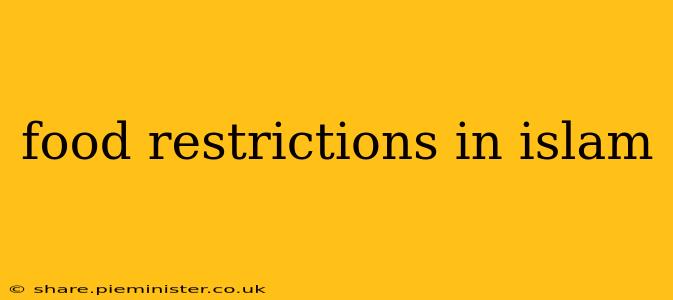Islam, a faith followed by billions worldwide, has specific guidelines regarding food consumption, known as Halal and Haram. Understanding these dietary laws is crucial for Muslims and anyone interested in learning about Islamic culture and practices. This guide will delve into the specifics of Islamic food restrictions, addressing common questions and misconceptions.
What is Halal and Haram?
The Arabic word "Halal" means "permitted" or "lawful," referring to foods and actions permissible under Islamic law. Conversely, "Haram" means "forbidden" or "unlawful," denoting foods and actions strictly prohibited. The distinction between Halal and Haram is rooted in the Quran and the Sunnah (the teachings and practices of the Prophet Muhammad).
What Foods are Haram (Forbidden) in Islam?
Several categories of food are considered Haram:
-
Carrion (Meat of Dead Animals): Animals that have died naturally, without proper slaughter, are forbidden. This includes animals found already dead.
-
Blood: Consuming blood in any form is prohibited. This includes blood added to food products.
-
Pork and Pork Products: All forms of pork, including bacon, ham, sausage, and lard, are strictly forbidden.
-
Animals Not Slaughtered According to Islamic Law (Zabiha): Animals must be slaughtered in a specific manner, invoking the name of Allah, to be considered Halal. This method ensures a swift and humane death. Improper slaughter renders the meat Haram.
-
Animals of Prey: Animals known for hunting and killing other animals, such as lions, wolves, and dogs (with some exceptions depending on interpretation), are generally considered Haram.
-
Birds of Prey: Similar to animals of prey, birds that hunt and kill other animals are generally forbidden.
-
Reptiles and Amphibians: Snakes, lizards, frogs, and other reptiles and amphibians are typically considered Haram.
-
Intoxicants: Alcohol and other intoxicating substances are strictly prohibited in Islam.
-
Animals Dedicated to Other Than Allah: Animals sacrificed to idols or other deities are Haram.
What Foods are Halal (Permitted) in Islam?
Generally, most foods are considered Halal unless explicitly forbidden. This includes:
-
Meat from Halal Animals: Beef, lamb, goat, chicken, turkey, and fish (with scales and fins) are Halal if slaughtered according to Islamic guidelines.
-
Fruits and Vegetables: Most fruits, vegetables, grains, and legumes are considered Halal.
-
Dairy Products: Milk, cheese, yogurt, and other dairy products from Halal animals are permissible.
-
Eggs: Eggs from Halal birds are permitted.
-
Honey: Honey is considered a Halal food.
What about Gelatin and Additives?
This is where it gets tricky. Many processed foods contain ingredients derived from Haram sources, such as gelatin from pork or alcohol-based extracts. Muslims must carefully check food labels for potential Haram ingredients. The presence of even a small amount of Haram can render the entire product Haram, depending on the interpretation. Look for Halal certification labels for assurance.
Are there different interpretations of Halal and Haram?
Yes, there are different schools of thought within Islam, leading to slight variations in the interpretation of specific dietary rules. For instance, some interpretations might permit the consumption of certain types of fish not explicitly mentioned in the Quran. It is advisable to consult with a knowledgeable religious scholar for clarification on specific cases.
How is Halal Meat Slaughtered?
Halal slaughter, also known as Zabiha, involves a swift cut to the jugular vein, carotid artery, and windpipe, ensuring a quick and painless death. The animal must be alive and healthy before slaughter, and the name of Allah is invoked during the process. This method is believed to minimize suffering and ensure the meat's purity.
What are the health benefits of a Halal diet?
While the primary focus of Halal dietary laws is religious observance, many find that it promotes a healthier lifestyle. The emphasis on fresh, whole foods, and the prohibition of pork and alcohol can contribute to a balanced and nutritious diet. However, it's crucial to remember that a Halal diet is not inherently healthier than any other diet unless it is carefully planned to include a variety of nutritious foods.
Can vegetarians be Muslim?
Absolutely. Islam does not mandate the consumption of meat; a vegetarian diet can be perfectly compatible with Islamic dietary laws as long as all ingredients adhere to Halal principles.
This comprehensive guide provides a clearer understanding of food restrictions in Islam. Remember, adhering to Halal guidelines is a personal commitment for Muslims, demonstrating their faith and devotion. This detailed look at Halal and Haram helps clarify many questions surrounding Islamic dietary laws.
